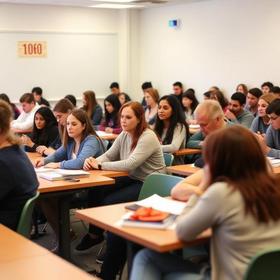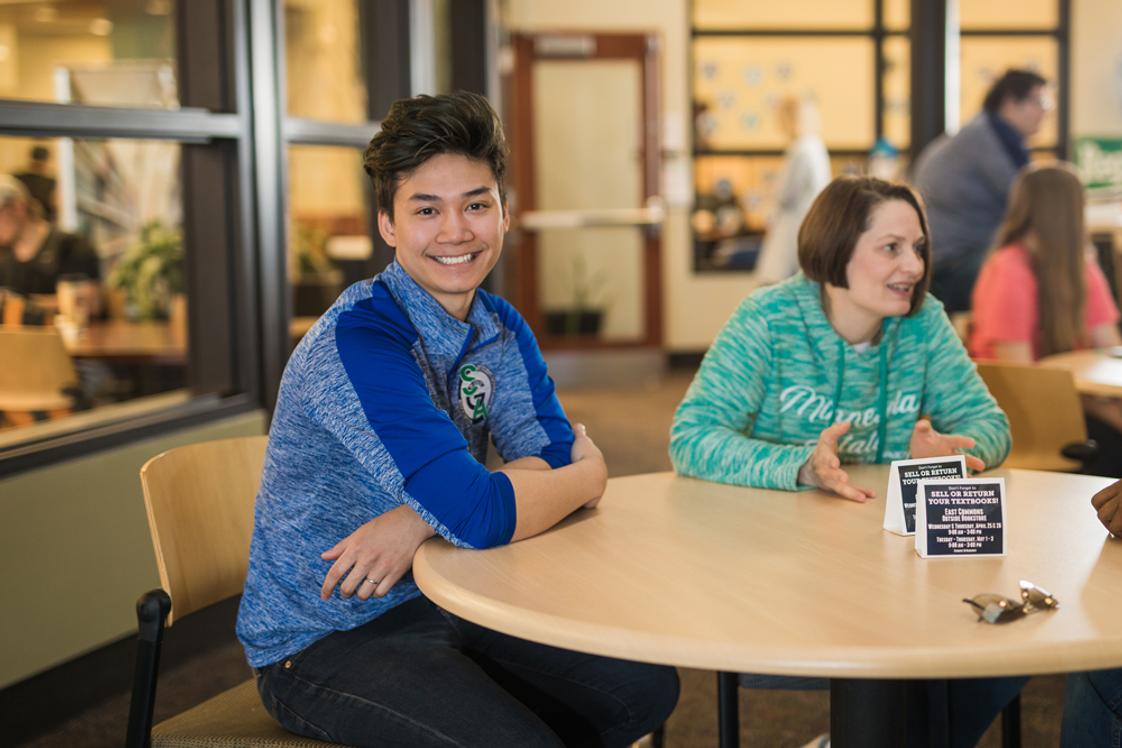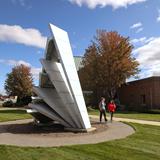- At Minnesota State Community and Technical College, you can choose from four unique campus experiences, flexible scheduling options and an array of student life activities including athletics and fine arts.
School Highlights
Minnesota State Community and Technical College serves 6,556 students (32% of students are full-time).
The college's student-teacher ratio of 13:1 is lower than the state community college average of 22:1.
Minority enrollment is 26% of the student body (majority Black), which is less than the state average of 42%.
Quick Facts (2026)
- Enrollment: 6,556 students
- In-state tuition: $5,502
- Out-state tuition: $5,502
- Acceptance Rate: 80%
- Student-teacher ratio: 13:1
- Minority enrollment: 26%
- Source: Verified school update
Top Rankings
Minnesota State Community and Technical College ranks among the top 20% of public schools in Minnesota for:
Category
Attribute
Debt For Students
School Overview
The teacher population of 515 teachers has stayed relatively flat over five years.
Minnesota State Community and Technical College
(MN) Community College Avg.
Carnegie Classification
Associate's Colleges: High Career & Technical-Mixed Traditional/Nontraditional
Associate's Colleges: Mixed Transfer/Career & Technical-Mixed Traditional/Nontraditional
Institution Level
At least 2 but less than 4 years
At least 2 but less than 4 years
Institution Control
Public
Public
Total Faculty
515 staff
171 staff
School Calendar
Student Body
The student population of Minnesota State Community and Technical College has grown by 13% over five years.
The student-teacher ratio of 13:1 has decreased from 14:1 over five years.
The Minnesota State Community and Technical College diversity score of 0.44 is less than the state average of 0.63. The school's diversity has grown by 52% over five years.
Total Enrollment
6,556 students
2,858 students
Student-Teacher Ratio
13:1
22:1
# Full-Time Students
2,079 students
1,050 students
# Part-Time Students
4,477 students
1,808 students
# Enrollment Undergraduate
655 students
420 students
# Full-Time Undergraduate Students
2,079 students
915 students
# Full-Time Graduate Students
n/a
38 students
# Part-Time Undergraduate Students
4,477 students
1,771 students
# Part-Time Graduate Students
n/a
12 students
Total Dormitory Capacity
152 students
116 students
% American Indian/Alaskan
1%
1%
% Asian
2%
6%
% Hispanic
5%
8%
% Black
10%
15%
% White
74%
58%
% Hawaiian
n/a
1%
% Two or more races
4%
4%
% Non Resident races
n/a
1%
% Unknown races
3%
6%
Diversity Score
0.44
0.63
College Completion Rate (Students who graduate in less than 4 years)
42%
34%
College Completion Rate (Students who graduate in 4 years or more than 4 years)
n/a
57%
Average Graduate Earnings (10 Years)
$36,100
$36,900
Tuition and Acceptance Rate
The public in-state tuition of $5,502 is more than the state average of $5,489. The in-state tuition has stayed relatively flat over four years.
The public out-state tuition of $5,502 is less than the state average of $6,145. The out-state tuition has stayed relatively flat over four years.
In-State Tuition Fees
$5,502
$5,489
Out-State Tuition Fees
$5,502
$6,145
Tuition Notes
2019-20 Tuition and Fees for resident and non-resident
% Students Receiving Some Financial Aid
84%
89%
Median Debt for Graduates
$12,000
$12,264
Median Debt for Dropouts
$7,000
$6,750
Acceptance Rate
80%
94%
SAT Reading
n/a
625
SAT Math
n/a
600
SAT Writing
n/a
565
ACT Composite
n/a
24
ACT English
n/a
24
ACT Math
n/a
23
ACT Writing
n/a
8
Sports
Total Sports Offered
8 sports
Sports
ArcheryBaseball
BasketballFootball
GolfRiflery
SoftballVolleyball
Extracurriculars
Total ExtracurricularsTotal Extra-curric.
36 extracurriculars
ExtracurricularsExtra-curric.
Club or Organization:
Arts and Music Programs:
Recreational Athletic Programs:
Architectural Technology Student AssociationAssociate Degree Nursing Organization
Auto Tech ClubBusiness Professionals of America
Campus Crusade for ChristChristian Bible Fellowship
College AmbassadorsConstruction Management Student Organization
Cosmetology ClubCriminal Justice Association
Dental Assisting organizationDiesel Club
Electrical Line Workers OrganizationEquiUs Equine Club
F2CO ChemistryGaming and Robotics
Gaming ClubMu Alpha Theta
Multicultural Student AssociationPhi Theta Kappa (national honor society)
PowerSports ClubSkillsUSA
Student American Dental Hygienists' AssociationStudent Government Association
Student Human Resources OrganizationStudent Nursing Organization
Technology
Arts and Music Programs:
Chamber ChoraleConcert Band
Concert ChoirJazz Band and theatre
Voice Ensemble
Recreational Athletic Programs:
flag footballIntramural sports can include basketball
soccer and bowling.volleyball
Source: 2024 (or latest year available) Integrated Postsecondary Education Data System (IPEDS) , School Administrators
School Notes
- At Minnesota State Community and Technical College, you can choose from four unique campus experiences, flexible scheduling options and an array of student life activities including athletics and fine arts. We offer more than 80 career and technical programs and also serve as the top transfer institution for students attending Minnesota State University Moorhead, North Dakota State University, University of North Dakota and Concordia College.
- At M State, students benefit from extensive online options, quality instruction from highly credentialed instructors and personalized small class sizes. More than 20 of our programs can be completed online. Campuses are located in Detroit Lakes, Fergus Falls, Moorhead and Wadena.
- Our unique programs include Autism Spectrum Disorder, Cardiovascular Technology - Invasive, Child and Adolescent Therapeutic Behavioral Health, Cosmetology, Cybersecurity, Database Administration, Dental Assisting and Hygiene, Digital Marketing, Electrical Lineworker, Electrical Technology, Medical Assistant, Medical Laboratory Technology, Music, Nursing, Phlebotomy Technician, PowerSports Technology, Purchasing and Inventory Management, Radiologic Technology, Social Media Management, Sport Management, Surgical Technology, and Theatre and Visual Arts.
- Transfer pathways include accounting, art, biology, business, political science, psychology and theatre arts.
Frequently Asked Questions
How much does Minnesota State Community and Technical College cost?
Minnesota State Community and Technical College's tuition is approximately $5,502 for In-State students and $5,502 for Out-State students.
What is the acceptance rate of Minnesota State Community and Technical College?
The acceptance rate of Minnesota State Community and Technical College is 80%, which is lower than the state average of 94%.
What sports does Minnesota State Community and Technical College offer?
Minnesota State Community and Technical College offers 8 interscholastic sports: Archery, Baseball, Basketball, Football, Golf, Riflery, Softball and Volleyball.
What is Minnesota State Community and Technical College's ranking?
Minnesota State Community and Technical College ranks among the top 20% of community college in Minnesota for: Least debt for graduating students.
Recent Articles

Part-Time vs. Full-Time Enrollment in 2025: Which Is Better?
Explore part-time vs. full-time enrollment in 2025, comparing costs, flexibility, outcomes, and goals to help students choose the right path.

How Community Colleges Use AI Tools to Support Student Success
Explore how community colleges are using AI tools in 2025 to improve advising, learning, retention, and student success.

Nontraditional Student’s Guide to Community College 2025
Comprehensive guide for nontraditional students at community college with updated tuition, support, careers, and success strategies for 2025.



















